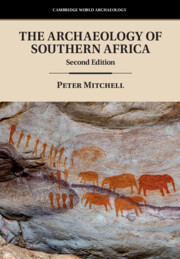Book contents
- Frontmatter
- Contents
- List of Figures
- List of Tables
- Acknowledgments
- 1 Introduction
- 2 Frameworks
- 3 Contexts
- 4 Origins
- 5 A Cognitive Revolution
- 6 Hunter-Gatherers of the Late Pleistocene
- 7 Archaeologies of the Pleistocene/Holocene Transition
- 8 Hunting, Gathering, Intensifying: Forager Histories in the Holocene before 2000bp
- 9 Taking Stock: Herders and Hunter-Gatherers
- 10 Farmers and Foragers: the First Millennium
- 11 Forming States: the Zimbabwe Culture and its Neighbours
- 12 Recent Farmers and Hunter-Gatherers in Southernmost Africa
- 13 Colonisation, Conquest, Resistance
- 14 Perspectives and Prospects
- Glossary
- References
- Index
10 - Farmers and Foragers: the First Millennium
Published online by Cambridge University Press: 15 May 2024
- Frontmatter
- Contents
- List of Figures
- List of Tables
- Acknowledgments
- 1 Introduction
- 2 Frameworks
- 3 Contexts
- 4 Origins
- 5 A Cognitive Revolution
- 6 Hunter-Gatherers of the Late Pleistocene
- 7 Archaeologies of the Pleistocene/Holocene Transition
- 8 Hunting, Gathering, Intensifying: Forager Histories in the Holocene before 2000bp
- 9 Taking Stock: Herders and Hunter-Gatherers
- 10 Farmers and Foragers: the First Millennium
- 11 Forming States: the Zimbabwe Culture and its Neighbours
- 12 Recent Farmers and Hunter-Gatherers in Southernmost Africa
- 13 Colonisation, Conquest, Resistance
- 14 Perspectives and Prospects
- Glossary
- References
- Index
Summary
This chapter looks at the establishment of farming communities in the east of southern Africa within the broader context of agropastoralist expansion south of the Equator and the spread of Bantu languages. Much of the literature on this topic depends heavily on analysis of ceramic design and arguments linking variation in this to variation in broad ethnolinguistic affiliations. The cultural-historical framework based on this is discussed, but alternative methods of ceramic classification are also explored, while the antiquity and utility of the Central Cattle Pattern settlement structure and its cognitive associations are critically assessed. In their dependence on a direct historical approach that is projected far back into the past both questions provide an agriculturalist counterpoint to the use of Bushman ethnography for understanding archaeological hunter-gatherer societies. Beyond these more theoretical concerns, Chapter 10 also emphasises the role of metallurgy, the social relations and subsistence base of early farming societies, the start of their engagement with Indian Ocean trade networks, and their interactions with pre-existing forager communities.
Keywords
- Type
- Chapter
- Information
- The Archaeology of Southern Africa , pp. 272 - 313Publisher: Cambridge University PressPrint publication year: 2024



